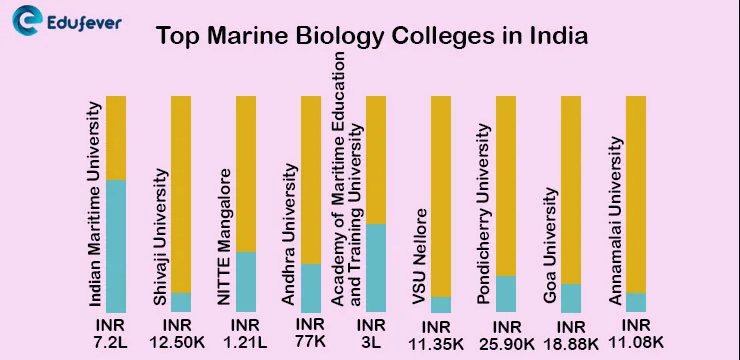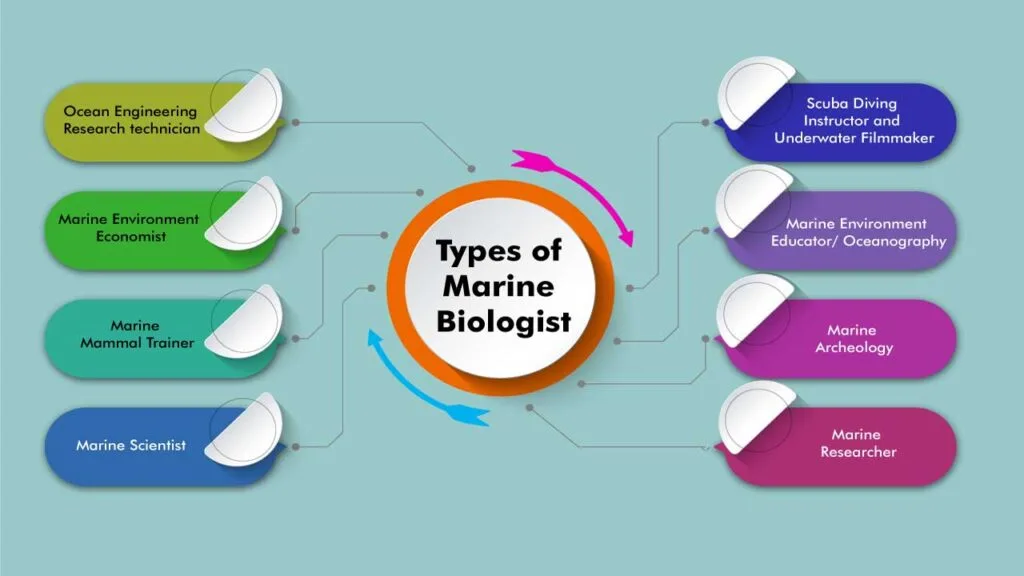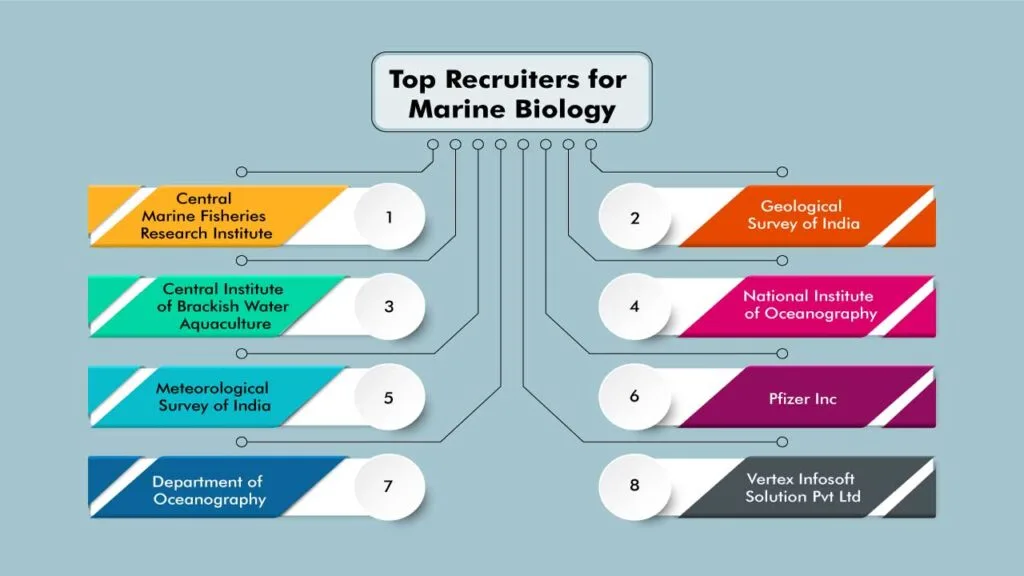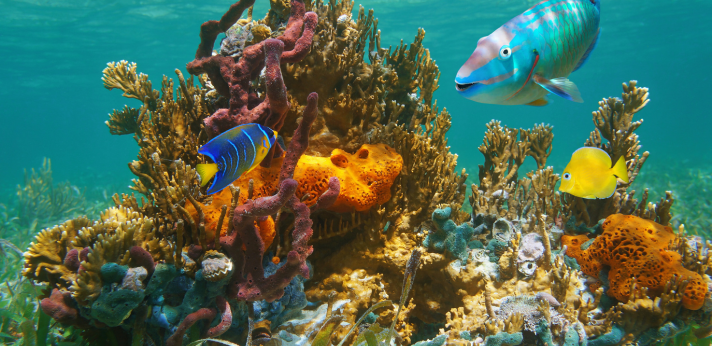Career in Marine Biology: Marine Biology is the science that deals with animals and plants that live in the sea. It also deals with airborne and terrestrial organisms that depend directly upon bodies of salt water for food and other necessities of life. In the broadest sense, it attempts to describe all vital phenomena of the living things that dwell in the world’s vast oceans. Marine biology is closely related to the science of oceanography as the relationship between the physical features of the oceans and the living organisms that dwell in them. It aids in understanding marine geology by studying organisms that contribute their skeletal remains to the floors of the oceans or elaborate the vast coral reefs of the tropical seas.
As the world population increases, people will become more dependent on the ocean for food and other basic needs. By incorporating the latest technologies into marine biology, the sea can be transformed into an ultimate food source, transportation, waste disposal, drinking water, and energy source. The following article will give you a brief idea about the Career in Marine Biology in India. Read in-depth info on different Marine Biology jobs that are available after taking courses.
If you are passionate about saving the lives of injured marine creatures, then Marine Biology is the right profession for you. The following article will help you solve questions like, do I want to become a Marine Biologist?
[Index]
Quick Facts
Before you is the summary for the marine biology course:
| Particulars | Description |
|---|---|
| Courses | Bachelor of Science in Marine Biology Master of Science in Marine Biology Certificate courses in Marine Biology Master of Science (M.Sc.) Master of Philosophy (M.Phil.) in Marine Biology Doctor of Philosophy (PhD) in Marine Biology |
| Duration | Merit and entrance-based |
| Eligibility | Ocean Engineering, Research Technician, Marine Environment Economist |
| Admission Procedure | Ocean Engineering, Research Technician, Marine Environment Economist |
| Average Salary | 5-9 L Per Annum |
| Types of Marine Biologist | Ocean Engineering, Research technician, Marine Environment Economist |
| Skills | Numerical and statistics skills, Practical fieldwork skills, Good observation skills and Patience. |
| Top Recruiters | Meteorological Survey of India, Department of Oceanography |
What is Marine Biology?
Marine Biology is a scientific discipline that deals with all types of sea creatures or marine bodies of water. It studies various life forms in the ocean and their behaviour and interactions with each other and the environment. Marine Biology consists of multiple sub-disciplines.
A principal aim of marine biology is to discover how ocean phenomena control the distribution of organisms. Marine biologists study how particular organisms are adapted to the seawater’s various chemical and physical properties of the seawater, the movements and currents of the ocean, the availability of light at multiple depths, and the solid surfaces that make up the seafloor. Special attention is given to determining the dynamics of marine ecosystems, particularly to understanding food chains and predator-prey relationships.
Some marine Biologists may work on algae and other microorganisms, while others may concentrate on large animals like fish. Marine Biologists study core subjects like Physics, Biology, Chemistry, Ecology, Mathematics, Geology, and Anthropology and apply this knowledge to studying oceans and ocean life forms.
Who is a Marine Biologist?
A person who specialises in Marine Biology and pursues Marine Biology Courses is commonly known as a Marine Biologist. Sometimes, a Marine Biologist can be referred to as a Marine Scientist, Marine Life Biologist, or Ocean Biologist.
Marine scientists are trained professionals who examine various sea creatures. They can continue their studies by specialising in a large ocean animal or a microscopic sea organism. A marine scientist’s work centres more on research and fieldwork than simply sitting on a bench and doing studies.
Various Marine Biology Courses in India
To work as a Marine Biologist or to make a career in Marine Biology, one can earn a degree in the following Marine Biology courses.
Certificate Course
The following is the certificate course for the marine biology course:
| Course Name | Duration |
|---|---|
| Certificate courses in Marine Biology | 6 months |
Undergraduate Course
The following is the undergraduate course for marine biology course:
| Course Name | Duration |
|---|---|
| Bachelor of Science in Marine Biology | 3 years |
Postgraduate Courses
The following is the undergraduate course for the marine biology course:
| Course Name | Duration |
|---|---|
| Master of Science in Marine Biology | 2 years |
| Master of Science (M.Sc.) | 2 years |
| Master of Philosophy (M.Phil.) in Marine Biology | 2 years |
PhD Course
| Course Name | Duration |
|---|---|
| Doctor of Philosophy (PhD) in Marine Biology | 3 year |
How do you get admission to the marine biology course?
- 10+2 in the science stream with biology as additional subjects are eligible.
- The candidate should score a minimum of 55% during their 10+2 exams.
- Direct admissions based on cut-offs are given in a few colleges.
- Candidates must have completed a bachelor’s degree in life sciences such as botany, aquaculture, marine biology, zoology, biochemistry, microbiology, and biotechnology with a minimum of 55-60% aggregate marks for postgraduation. Universities offering M.Sc./M. Phil conducts their entrance exams for admission. Selection is based on the candidates’ performance in the entrance examination.
- The students who have accomplished their MSc with at least 55% marks can apply for a PhD with preferable specialisations: Marine Biology, Zoology, Botany, Biochemistry, Biotechnology, Fisheries, and Life Science.
Eligibility Criteria
The following are the eligibility criteria for students who want to pursue undergraduate marine biology courses:
Undergraduate Course
The following are the eligibility criteria for an undergraduate course in marine biology:
| Particulars | Description |
|---|---|
| Age Limit | The minimum age limit is 17 years. |
| Qualification | 10+2 with a minimum aggregate of 55% in the science stream, with biology as an additional subject. |
| Qualifying Entrance Exam | Merit-based, though some colleges conduct entrance examinations for admission, and those who clear the exam are selected. |
Postgraduate Course
The following are the eligibility criteria for a postgraduate course in marine biology:
| Particulars | Description |
|---|---|
| Qualification | Candidates must have completed a bachelor’s degree in life sciences such as botany, aquaculture, marine biology, zoology, biochemistry, microbiology and biotechnology with a minimum of 55-60% aggregate marks for a bachelor’s degree. |
| Qualifying Entrance Exam | Selection is based on the performance of the candidates in the entrance examination. |
PhD Course
The following are the eligibility criteria for the PhD course in marine biology:
| Particulars | Description |
|---|---|
| Qualification | The students who have accomplished their MSc with at least 55% marks can apply for this course with preferable specialisations Marine Biology, Zoology, Botany, Biochemistry, Biotechnology, Fisheries, and Life Science. |
| Qualifying Entrance Exam | Admissions are held through entrance examinations(UGC NET, CSIR NET, AURCET) and personal interviews. |
Top Marine Biology Colleges in India
Below are some of the top marine biology colleges in India with average fees:
| Colleges Name | Location | Average Fees |
|---|---|---|
| Indian Maritime University | Coimbatore | INR 7.2L |
| Shivaji University | Kolhapur | INR 12.50K |
| NITTE Mangalore | Karnataka | INR 1.21L |
| Andhra University | Vishakhapatnam | INR 77K |
| Academy of Maritime Education and Training University | Chennai | INR 3L |
| VSU Nellore | Andhra Pradesh | INR 11.35K |
| Pondicherry University | Pondicherry | INR 25.90K |
| Goa University | Goa | INR 18.88K |
| Annamalai University | Tamil Nadu | INR 11.08K |

Career Opportunities
The demand for Marine Biologists is rising since much of the earth is full of oceans and marine bodies. A Marine Biologist can easily find a job in universities and colleges as many colleges pursue Marine Biology.
Job Profile
| Marine Ecologist and Dive Operations Manager | Marine Biology Technician |
| Consultant in Marine Ecology | Professor in Marine Ecology |
| Fishery Data Manager | Reef Restoration Project Manager |
Some international, federal, and state organisations offer multiple job opportunities for Marine Biologists as researchers, fisheries biologists, environmental consultants, naturalists, marine illustrators, aquarium employees, biotechnology specialists, ecological lobbyists and aquaculturists.
Types of Marine Biologists
There are various job profiles from which the candidates can choose according to their interests and qualifications. Below are some of the job profiles:
| Ocean Engineering | Research technician |
| Marine Environment Economist | Marine Mammal Trainer |
| Marine Scientist | Scuba Diving Instructor and Underwater Filmmaker |
| Marine Environment Educator/ Oceanography | Aquatic Veterinarian |
| Marine Archeology | Marine Researcher |

Role of a Marine Biologist
The following is the role of a marine biologist:
- I supervise inventories and test and monitor marine life exposed to pollutants.
- Collect and analyse samples and develop new theories based on this research.
- Engage in coring techniques, geographic information systems (GIS), visual recording and sampling to determine the marine environment’s health.
- Preserve specimens and samples of known and unknown species and diseases.
- Track the distribution, ranges and movements of marine populations.
Skills of a Marine Biologist
To be a marine biologist, you should possess some of the following skills required for a marine biologist:
- Familiarity with the marine environment and an interest in aquatic life.
- Numerical and statistics skills.
- Practical fieldwork skills.
- Good observation skills and Patience.
- Teamwork and personal communication abilities.
- Written and oral communication skills.
- To be prepared to work outdoors in all weathers – perhaps at sea.
Salary of a Marine Biologist
The following is the average salary of a marine biologist:
| Job | Average Salary |
|---|---|
| Marine Biologist | INR 5-9L |
| Fisheries Biologist | INR 6-8L |
| Biological Technician | INR 5-7L |
| Professor | INR 7-10L |
| Reef Restoration Manager | INR 6-8L |
| Aquatic Biologist | INR 7-9L |
10 Jobs in Marine Biology To Consider
- Horticulturist
- Natural resource technician
- Marine research technician
- Marine conservation coordinator
- Wildlife biologist
- Marine scientist
- Environmental Consultant
- Microbiologist
- Environmental planner
- Marine histologist
You can read in detail here: 10 Jobs in Marine Biology To Consider (With Salary Info)
Top Recruiters for Marine Biology
The following are the top recruiters for marine biology courses:
- Central Marine Fisheries Research Institute
- Central Institute of Brackish Water Aquaculture
- Meteorological Survey of India
- Department of Oceanography
- Geological Survey of India
- National Institute of Oceanography
- Pfizer Inc
- Vertex Infosoft Solution Pvt Ltd

Frequently Asked Question(FAQs)
Is a marine biology class hard?
Within those, you can specify further, work on the physiology of a group or do genetics to the point where it is more molecular than marine biology, yet you are still a marine biologist. That said, yes, it can be very competitive, and it may be hard to find a job.
Where are marine biologist jobs located?
A marine biologist can be employed at university research laboratories, private companies, government research laboratories, and nonprofit environmental advocacy organisations.
Is marine biology a promising career?
Marine biology is a promising career because the workspace, such as on a research vessel, can be cramped. Marine biologists must get along with various people, from subordinates to peers and supervisors. They also need good coordination and strong problem-solving, negotiation and time-management skills.
Do marine biologists have to swim?
No, marine biologists do not have to be able to swim. The roles are lab-based or work field, which involves surveys on shorelines or boats.
Marine biology courses after the 12th?
Marine biology courses after the 12th are:
>Bachelor of Science in Marine Biology
>Master of Science in Marine Biology
>Certificate courses in Marine Biology
>Master of Science (M.Sc.)
>Master of Philosophy (M.Phil.) in Marine Biology
>Doctor of Philosophy (PhD) in Marine Biology
Does the Marine Biologist have a huge career scope?
A lot of creatures live in the ocean, but we don’t even know how many because there are still many more to discover. The ocean covers about 71% of Earth’s surface and is like a huge three-dimensional world. Marine biology studies all sorts of habitats in the ocean, from the tiniest layers of water near the surface where things get stuck, to the very deep trenches that can go down more than 10,000 meters.

Hi thank you very much
It was more helpful for me.
I wanted to ask that
If I want to be an marine biologist then I should 1st go to degree courses like BSE ?
Yes.
Do we require to take both maths and biology in class 11 & 12 to pursue a career as a marine biologist?
Yes
What will be admission fees and schedule for marine biology
It depends on different different Universities.